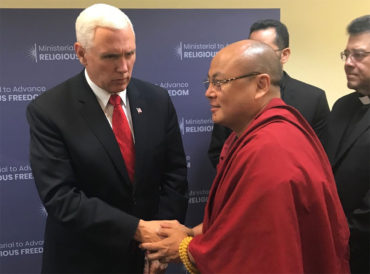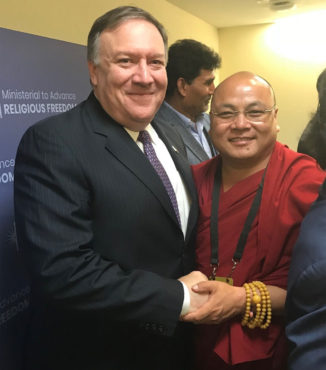
Golok Jigme, a Tibetan monk and activist who was arrested and tortured for speaking out against China’s oppressive rule, discussed the situation in Tibet with US Vice President Mike Pence.
Golok Jigme, a Tibetan Buddhist monk who was jailed and tortured by Chinese authorities for speaking out against their oppressive rule in Tibet, talked with the two American leaders in the sidelines of the US State Department’s Ministerial to Advance Religious Freedom. The three-day event in Washington, DC was a first-of-its-kind gathering of elected officials, international organizations, religious leaders and civil society members to advocate for greater religious freedom around the globe.
Jigme told Pence and Pompeo that the people of Tibet—a historically independent nation that China has occupied for nearly 70 years—are prevented from receiving teachings from the Dalai Lama, the spiritual leader of Tibetan Buddhism. In fact, Tibetans can be punished simply for having portraits of the Dalai Lama.
Jigme urged Pence to encourage China’s leadership to work with the Dalai Lama to resolve the Tibetan issue and allow the Tibetan people to have true religious freedom.
Jigme also spoke up on behalf of the Panchen Lama, the second most well known figure in Tibetan Buddhism, who was kidnapped by the Chinese government 23 years ago and has not been seen in public since. Jigme asked that the U.S. government work to secure his release.
During his address to the ministerial, Pence mentioned Jigme by name, saying “We are honored by your presence, and we admire your courage and your stand for liberty.”
Pence also described Jigme’s heroic personal story. Ten years ago, Jigme helped create “Leaving Fear Behind,” a documentary that features average Tibetans discussing China’s brutality in Tibet. For this act of free expression, Jigme was arrested, severely tortured and detained for seven months before his release in October 2008.

Golok Jigme discusses the situation in Tibet with Secretary of State Mike Pompeo.
“While he escaped,” Pence said during his speech, “his people’s fight to practice their religion and protect their culture goes on.”
Pence’s remarks capped a remarkable week in Washington, DC for the Tibetan movement. The day before Pence’s speech, the U.S. House Judiciary Committee unanimously approved the Reciprocal Access to Tibet Act, a legislation that seeks to combat China’s attempts to isolate Tibet from the outside world.
On July 25 afternoon, a video message from the Dalai Lama was screened at the conference. The Dalai Lama stressed the importance of promoting religious harmony. The Dalai Lama’s Representative Ngodup Tsering and emissary Demo Rinpoche attended the conference. The Karmapa attended the session on July 26.
ICT was present at the Ministerial to Advance Religious Freedom, with President Matteo Mecacci and Vice President Bhuchung Tsering, who was assisting Golok Jigme.

